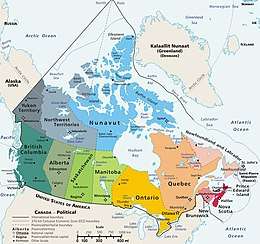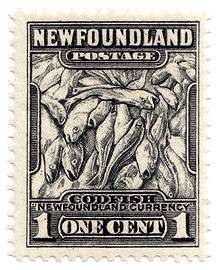Cod Island
Cod Island is an uninhabited island in the northern coast of Newfoundland and Labrador, Canada.[1][2] It is located in the province of Newfoundland and Labrador, in the eastern part of the country, 1,700km northeast of the capital Ottawa. The total area of the island is 133 square kilometers.[3]
 Cod Island Cod Island (Newfoundland and Labrador) | |
 Cod Island | |
| Geography | |
|---|---|
| Location | Labrador Sea, Eastern Canada |
| Coordinates | 57.783455°N 61.782345°W |
| Area | 132.71 km2 (51.24 sq mi) |
| Highest elevation | 914 m (2,999 ft) |
| Highest point | Cod Island High Point |
| Administration | |
Canada | |
| Province | Newfoundland and Labrador |
| Demographics | |
| Population | Uninhabited |
| Additional information | |
| Time zone |
|
| • Summer (DST) |
|
Early hydrographers referred to the island as Ogua-Lik.[4][5][6] On 7 March 1957 the island received its current name.[7]
Background

Cod island takes it name from the Atlantic cod which may be found in the area.[8][9]
During the 17th and 18th centuries in the New World, especially in Massachusetts and Newfoundland, cod became a major commodity, creating trade networks and cross-cultural exchanges.[10]
Geography
Cod Island has hilly terrain with three of its peaks partially composing the Kaumajet Mountains.[11][12] The island's highest point is 914 meters above sea level.[11] It extends 15.7 kilometers in the north-south direction, and 15.4 kilometers in the east-west direction.[3]
The area around Cod Island consists mainly of grasslands.[13] The area around Cod Island is almost uninhabited, with less than two inhabitants per square kilometer.[14] Inland climate prevails in the area. The annual average temperature in the area is -5 °C. The hottest month is July, when the average temperature is 12 °C, and the coldest is February, with -20 °C.[15]
Table Hill
Table Hill is a hill on the southside of Cod Island.[16][17] The top of Table Hill is 819 meters above sea level, or 551 meters above the surrounding terrain. The width at the base is 6.1 km.[18][3]
The island has two dome shaped hills besides Table Hill.[6]
References
- Complete Atlas of the World (3rd ed.). Dorling Kindersley Limited. 2016. p. 59. ISBN 978-1-4654-4401-1. Retrieved 8 May 2019.
- Cod Island at GeoNames.Org (cc-by); post updated 18 January 2006; database dump downloaded 29 December 2015
- "Viewfinder Panoramas Digital elevation Model". Retrieved 21 June 2015.
- Royal Society of Canada (1897). Mémoires Et Comptes Rendus de la Société Royale Du Canada. Royal Society of Canada. p. CXXVIII. Retrieved 23 April 2019.
- United States Hydrographic Office (1884). H.O. Pub Issue 73. p. 564. Retrieved 5 May 2019.
- Great Britain Hydrographic Dept (1887). The Newfoundland and Labrador Pilot. p. 460. Retrieved 5 May 2019.
- "Canadian Geographical Names – CGN – GeoBase Series" (Database). Open Government Portal. Natural Resources Canada. 20 April 2017. Retrieved 8 May 2019.
- Duzer, Chet Van; Beck, Lauren (2017). Canada before Confederation: Maps at the Exhibition. Vernon Press. p. 36. ISBN 978-1-62273-266-1. Retrieved 27 April 2019.
IN. BACCALAVRAS, 'Cod Island,' relating to the New World natural resource that most consistently repaid European investment during the decades following its discovery.
- "ICES FishMap species factsheet-cod" (PDF). ICESCIEM. Retrieved 27 April 2019.
- Kurlansky, Mark (1997). Cod: A Biography of the Fish That Changed the World. New York: Walker. ISBN 978-0-8027-1326-1.
- "Kaumajet Mountains". Peakbagger.com. Retrieved 5 May 2019.
- Labrador and Hudson Bay Pilot. Canadian Hydrographic Service. 2. University of Michigan. 1965. p. 266.
- "NASA Earth Observations: Land Cover Classification". NASA/MODIS. Retrieved 30 January 2016.
- "NASA Earth Observations: Population Density". NASA/SEDAC. Retrieved 30 January 2016.
- "NASA Earth Observations Data Set Index". NASA. Retrieved 30 January 2016.
- Browne, Patrick William (1909). Where the Fishers Go: The Story of Labrador. Labrador: Cochrane publishing Company. p. 319. Retrieved 8 May 2019.
- Labrador and Hudson Bay Pilot. Canadian Hydrographic Service. 2. University of Michigan. 1965. p. 271.
- Table Hill at GeoNames.